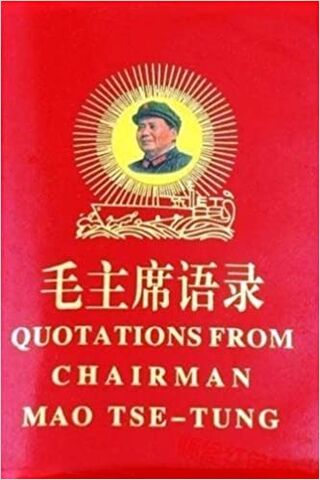Sex
Grand Progenitors
The excesses of Mao and his predecessors.
Posted October 23, 2020 Reviewed by Kaja Perina

In January of 1964, before the Cultural Revolution began, a collection of quotations from Mao Zedong was put together by the People’s Liberation Army Daily. After several revisions, a PLA commission issued a definitive version in May of 1965. The Ministry of Culture hoped it would become generally available to the masses in China, literally at their fingertips. Commonly issued on small pages under a colored cover, it was generally known as the Little Red Book.
In a tract “On the Correct Handling of Contradictions Among the People,” written in February 1957, Mao noted: “A dangerous tendency has shown itself of late among many of our personnel—an unwillingness to share the joys and hardships of the masses, a concern for personal fame and gain. This is very bad.” A Red Book chapter on “Correcting Mistaken Ideas” recapitulated that. “With victory, certain moods may grow within the Party—arrogance, the airs of a self-styled hero, inertia and unwillingness to make progress, love of pleasure and distaste for continued hard living.” A note from a chapter on “Discipline,” with more than a little male bias, added this: “Do not take liberties with women.” As a chapter on “Communists,” excerpted from a 1937 essay in Mao's Selected Works, had already summed up:
“A Communist should have largess of mind and he should be staunch and active, looking upon the interests of the revolution as his very life and subordinating his personal interests to those of the revolution; always and everywhere he should adhere to principle and wage a tireless struggle against all incorrect ideas and actions, so as to consolidate the collective life of the Party and strengthen the ties between the Party and the masses; he should be more concerned about the Party and the masses than about any individual, and more concerned about others than about himself. Only thus can he be considered a Communist.”
As far as a few disaffected Chinese were concerned, that made Mao a hypocrite.
Jung Chang became a Red Guard at the age of 14. But then her father, a Party activist and propagandist, was targeted by the Cultural Revolution. Ink was poured over his head, cards denouncing him were hung on his neck, he was forced to stand out in the rain, and he ended up in jail. His career was ruined, and his family was forced to leave home. He died in 1975. Three years later, his daughter emigrated to London.
Her biography, Mao: The Untold Story, was published in 2005. “When it came to personal lifestyle, Mao’s was one of royal self-indulgence, practiced at tremendous cost to the country. This corrupt behavior emerged as soon as he conquered China,” she wrote. Over 50 villas were set aside for his personal use, staged in gorgeous locations on enormous estates, set on whole mountainsides or long stretches of lakes. Food was flown in from all over the country. Hot towel massages were ordered on a regular basis. And Mao’s sexual appetite was indulged. The Chairman had 10 legitimate children, by 4 legitimate wives. And he had women on the side. “On 9 July 1953 the army was ordered to select young women from their entertainment groups to form a special troupe in the Praetorian Guard.” Some of those girl received subsidies, but others did not. “Apart from singers and dancers, nurses and maids were handpicked for Mao’s villas to provide a pool of women from which he could choose whoever he wanted to have sex with.” And over the course of the Cultural Revolution, in the middle of his purges, Mao took long walks in secluded hills along the lake at Hangzhou where he threw dancing parties, or recruited closer to home in Beijing. “While suspects were being interrogated under torture, while his old power base endured unprecedented suffering, Mao cavorted. The dancing still went on at Zhongnanhai with girls called in, some to share his large bed. To the tune of ‘The Pleasure-Seeking Dragon Flirts with the Phoenix,’ which was deemed ‘pornographic’ by his own regime, and long banned, Mao danced on.”
Li Zhisui became the personal physician of Mao Zedong in 1954, and held the job for 22 years. He kept more than 40 volumes of notes. Over the course of the Cultural Revolution, he had them burned. But after he emigrated to Chicago in 1988, what he remembered of those notes was put together in his Private Life of Chairman Mao, published in 1994.
Some of Mao’s women were other men’s wives. Their husbands hoped for promotions as a result, and were honored to offer them up. Occasionally they collectively romped. “He encouraged his sexual partners to introduce him to others for shared orgies, allegedly in the interest of his longevity and strength.” Other women were unattached. “They were all very young when they began serving Mao—in their late teens and early twenties—and usually unmarried. When Mao tired of them and the honor was over, they married young, uneducated men with peasant pasts.” And considered their previous public service an awesome honor. “During the Cultural Revolution, even the mangoes Mao presented to the workers became sacred objects, worshipped on altars, and a sip of the water in which a bit of one such mango had been boiled was drunk as a magic elixir. Imagine, then, what it meant for a young girl to be called into Mao’s chambers to serve his pleasure!”
There were precedents for that.
Emperors who founded dynasties in China were often honored with the title Grand Progenitor, or taizu. They included the Han dynasty founder (247-195 BC), Liu Bang; the Song dynasty founder (AD 927-976), Zhao Kuangyin; the Yuan dynasty founder (AD 1162-1227), Genghis Khan; and the Ming dynasty founder (AD 1328-1398), Hongwu, or Zhu Yuanzhang.
Ming emperors supported one Empress, an Empress Dowager, and a Grand Empress Dowager. On the side, there were 6 or more Honored Consorts, with Gracious Consorts, Worthy Consorts, Pure Consorts, Wholesome Consorts, and Consorts for Reverent Service, Ladies of Bright Deportment, Ladies of Handsome Fairness, Beautiful Ladies, Talented Ladies, Worthy Ladies, Chosen Attendants, Ladies and so on. They were selected by governors for their good looks or good manners, and sent to the capital 300 at a time. Some were teenagers, and there were thousands of them.
For people in many places, things have improved since Hongwu, and gotten much better since Mao.
May those trends go on.
References
Betzig, Laura. 2020. Eusociality in humans. In Lance Workman et al., Cambridge Handbook of Evolutionary Perspectives on Human Behavior. Cambridge: Cambridge University Press.
Betzig, Laura. 2020. Differential reproduction. In T. Shackelford, Handbook of Evolutionary Psychology. New York: Sage.
Chang, Jung and Jon Halliday. 2005. Mao: The Untold Story. New York: Anchor Books.
Li, Zhisui. 1994. The Private Life of Chairman Mao. 1995. New York: Random House.




